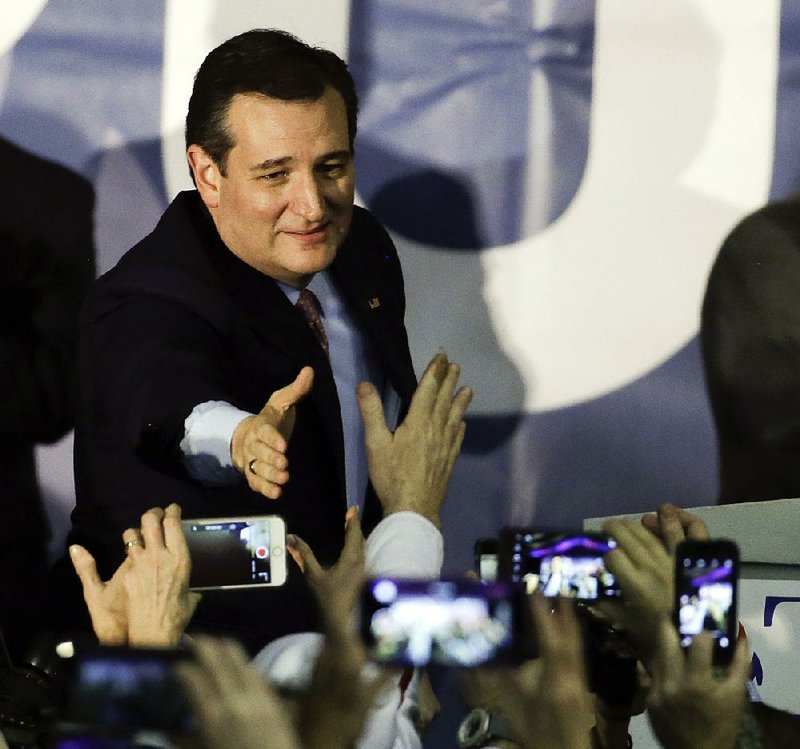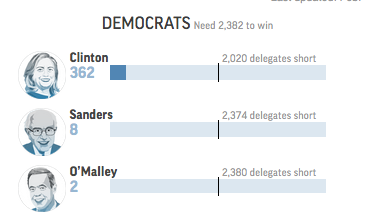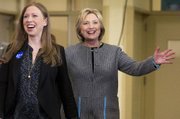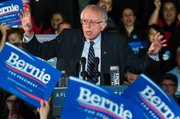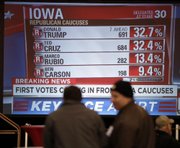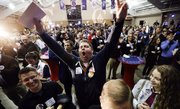DES MOINES, Iowa -- Sen. Ted Cruz of Texas swept to victory in Iowa's Republican caucuses Monday, overcoming billionaire Donald Trump and Sen. Marco Rubio of Florida. Among Democrats, Hillary Clinton and Bernie Sanders were deadlocked in a tight race.
With reports from 1,680 of 1,681 precincts, Cruz led with 51,649 votes. Closely behind him was Trump, with 45,416 votes, then Rubio with 43,132.
At that count, Cruz won eight delegates; Trump and Rubio each earned seven; Carson won three; Bush and Paul each won one.
On the Democratic side, with reports from 1,670 of 1,681 precincts, Clinton held a narrow lead with 695 to Sanders' 693 of what the party calls state delegate equivalents. The count reported to the public is based upon a calculation. Former Maryland Gov. Martin O'Malley, the only other Democratic candidate, had 8.
At that count, Clinton won 22 delegates and Sanders won 21.
Cruz's victory over Trump came after months of wooing the state's influential conservative and evangelical leaders.
"Iowa has sent notice that the Republican nominee and next president of the United States will not be chosen by the media, will not be chosen by the Washington establishment," Cruz said.
He called his win a rebuke against "Washington deals run amok" and credited what he said was the uniting of the "Reagan coalition" of evangelicals and blue-collar conservatives behind him.
Trump sounded humble in defeat, saying he was "honored" by the support of Iowans. And he vowed to keep up his fight for the Republican nomination.
"We will go on to easily beat Hillary or Bernie or whoever the hell they throw up," Trump told cheering supporters.
Rubio took on an optimistic tone, even congratulating Cruz, saying he'd "earned his victory."
Sanders draws young
Clinton, a former U.S. senator from New York and former secretary of state, took the stage at a campaign rally and said she was "breathing a big sigh of relief" but with the Democratic race too close to call.
"It is rare that we have the opportunity we do now, to have a real contest of ideas, to really think hard about what the Democratic Party stands for and what we want the future of our country to look like," Clinton said.
Sanders said before all votes were counted that the outcome looked like "a virtual tie" and declared, "Iowa, thank you."
For Clinton's supporters, the tight race with Sanders likely reminded her followers of her loss to President Barack Obama in 2008. Her campaign spent nearly a year building a massive get-out-the-vote operation in Iowa yet seemed to be caught off guard by the enthusiasm surrounding Sanders, a U.S. senator from Vermont.
A self-declared democratic socialist, Sanders drew large, youthful crowds across the state with his calls for breaking up big Wall Street banks and his fierce opposition to a campaign finance system that he said is rigged for the wealthy.
Sanders' appeal with young voters was evident: More than 8 in 10 caucusgoers under 30 came to support him, as did nearly 6 in 10 of those between ages 30 and 44. Clinton got the support of 6 in 10 caucusgoers between ages 45 and 64, and 7 in 10 of those 65 and over.
Caucusgoers were choosing between Clinton's pledge to use her wealth of experience in government to bring about steady progress on democratic ideals and Sanders' call for radical change in a system rigged against ordinary Americans.
"Hillary goes out and works with what we have to work with. She works across the aisle and gets things accomplished," said 54-year-old John Grause, a precinct captain for Clinton in Nevada, Iowa.
But 55-year-old Su Podraza-Nagle, who was caucusing for Sanders in the same town, said: "It's going to be Bernie. Hillary is history. He hasn't been bought."
Cruz has modeled his campaign after past Iowa winners, visiting all of the state's 99 counties. While Republican winners in Iowa have often faded later in the primary contest, Cruz's campaign said it has the financial resources to remain viable.
Cruz supporter Shane VanderHart, 43, of Pleasant Hill, Iowa, said he believes Cruz will repeal the health insurance program introduced by Obama in 2010, a longtime but pledge by Republican candidates.
"When he says he's going to repeal it, I believe him because he's followed through on his campaign promises in the Senate," VanderHart said.
Michael Napuunoa, 25, an electrician from Des Moines, said he liked Cruz's promise to strengthen the military and fight terrorism.
"He may not be as aggressive as Trump," Napuunoa said. "But I don't want a hothead. I want a man who's going to get the job done and not kill everyone in the process."
Head start in N.H.
At stake in Iowa was early momentum in the presidential campaign, and for some candidates, the future of their White House hopes altogether.
Republicans John Kasich, Chris Christie and Jeb Bush, all of whom trailed in the caucuses, spent Monday night in New Hampshire -- not only to get a jump on the weather but also on their competitors in a state with voters who on Feb. 9 are expected to be friendlier to more traditional GOP candidates.
The caucuses marked the end of at least two candidates' White House hopes. Before the results were final, O'Malley ended his long-shot bid for the Democratic nomination, as did former Arkansas Gov. Mike Huckabee, running for the GOP nomination. Huckabee's 3,344 votes placed him in ninth place among the GOP contenders.
The events began at 7 p.m. Political operatives predicted a high turnout -- and there were reports that some sites were so packed that officials had trouble closing the doors -- despite a snowstorm that was bearing down on the state. Forecasters said the storm would likely hit after the caucuses were closed.
Candidates faced an electorate deeply frustrated with Washington. While the economy has improved under Obama's watch, the recovery has eluded many Americans. New terrorism threats at home and abroad have also ratcheted up national security concerns.
GOP caucusgoers were overwhelmingly motivated by their frustration with the government. Nine out of 10 Republican voters said they're angry or dissatisfied with Washington, according to surveys conducted by Edison Research for The Associated Press and television networks.
Six in 10 Democratic caucusgoers wanted a candidate who would continue Obama's policies. At least 4 in 10 said they were first-time caucus attendees, about the same proportion who said so in 2008.
In Iowa, which has for decades kicked off the presidential nomination contest, candidates also faced an electorate that's whiter, more rural and more evangelical than many states. But, given its prime leadoff spot in the primary season, the state gets extra attention from presidential campaigns.
Iowa has mixed results in picking eventual nominees. The past two Republican caucus winners -- Huckabee and former Sen. Rick Santorum of Pennsylvania -- faded as the race stretched on. But Obama's 2008 victory was instrumental in his path to the Democratic nomination, easing the anxieties of those who worried the young black senator would struggle to win white voters.
Clinton praised her campaign and her followers ahead of the primaries.
"We've got such a great campaign organization. We've got thousands of volunteers. We knocked on 125,000 doors this weekend. There's just so much excitement," Clinton said on NBC's Today show on Monday morning. "We hope that even though it's a tight race, a lot of the people who are committed to caucusing for me will be there and standing up for me. And I will do the same for them in the campaign and in the presidency."
Sanders aired more caution, telling volunteers and supporters in Des Moines earlier Monday that "We will struggle tonight if the voter turnout is low. That's a fact."
Trump had expressed cautious optimism about the caucuses.
"You have to be a little bit nervous, and you know I like to win," Trump said on ABC's Good Morning America show Monday morning.
Seeking to tamp down expectations, Cruz said Sunday, "If you had told me a year ago that two days out from the Iowa caucuses we would be neck and neck, effectively tied for first place in the state of Iowa, I would have been thrilled."
Cruz spent the closing days of the Iowa campaign focused intensely on Rubio, trying to ensure the Florida senator doesn't inch into second place. Rubio is viewed by many Republicans as a more mainstream alternative to Trump and Cruz.
Rubio, who previously lashed out at criticism, adopted the same reflective tone as many of his rivals on Monday, telling NBC that Cruz "has a very strong ground game." He dismissed attacks against him as "politics as usual."
While both parties caucused on the same night in Iowa, they did so with different rules.
Republicans vote by private ballot. The state's 30 Republican delegates are awarded proportionally based on the vote.
Democrats form groups at caucus sites, publicly declaring their support for a candidate. If the number in any group is less than 15 percent of the total, they can either bow out or join another viable candidate's group.
Those final numbers are awarded proportionately, based on statewide and congressional district voting, determining Iowa's 44 delegates to the national convention.
Information for this article was contributed by Julie Pace, Catherine Lucey, Lisa Lerer, Scott McFetridge, Scott Bauer, Steve Peoples, Jill Colvin and staff members of The Associated Press and by Jose A. DelReal, Juliet Eilperin, David Nakamura, Sean Sullivan, Robert Costa, Katie Zezima, Philip Rucker, John Wagner and Abby Phillip of The Washington Post.
A Section on 02/02/2016
